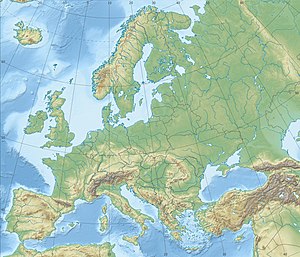Battle of Malojaroslavets
| date | October 24, 1812 |
|---|---|
| place | Malojaroslavets , Russia |
| output | tactical French victory |
| consequences | strategic Russian victory |
| Parties to the conflict | |
|---|---|
| Commander | |
| Troop strength | |
| 20,000 men | 15,000 men - 25,000 men |
| losses | |
|
5,000 men |
6,000 men |
Mir - Mogilev - Ostrovno - Kobrin - Klyastitsy - Gorodeczno - Smolensk - Polotsk I - Walutino - Borodino - Tschirikovo - Tarutino - Maloyaroslavets - Polotsk II - Vyazma - Lyachovo - Chaschniki - Smoljany - Krasnoi - Beresina
Location of the battlefield |
The battle of Malojaroslawez took place on October 12th July. / October 24, 1812 greg. took place during the Napoleonic Russian campaign . The Russians under Prince Kutuzov succeeded in moving the main French army under Emperor Napoleon to move the planned march to Kaluga and forcing him to retreat via Moshaisk .
prehistory
The deteriorating supply situation of the French Grande Armée and the catastrophic hygienic conditions forced Emperor Napoleon to evacuate Moscow on October 19 . Large parts of his troops suffered from fever and dysentery, so that only about 95,000 soldiers were able to fight when they left. The Young Guard under Marshal Mortier remained in the city as rearguard and to secure the march. Napoleon marched southwest to reach areas not yet emaciated from the war. The Russian commander in chief Prince Kutuzov tried to prevent this and ordered his VI. Corps under General Dochturow to prevent the advance of the French on Kaluga.
course
The 4th French Corps under the Viceroy of Italy Eugène de Beauharnais (13th, 14th, 15th Divisions ), consisting of French, Italians, Croats and Spaniards, was able to repel the attacks of the Russian forces under General Dochturow, which was a tactical success which meant Grande Armée . The French division general Delzons was killed in the fighting , as was Joseph Marie Levié, who was only appointed brigadier general on October 15. General Pino , French Brigadier General Jacques Fontane and three staff officers of the Viceroy were wounded.
On the Russian side, Major General Dorokhov was seriously wounded. He did not recover from his wound and died on May 7, 1815 as a result. On November 12, 1812, he was promoted to lieutenant general for his services in the battle of Borodino . The French general losses were significantly higher. The reason for this is that in the Russian army, unlike the French, there was no brigadier general. Russian brigades were mostly commanded by a colonel, sometimes even by a lieutenant colonel.
At the same time as the surging back and forth battle for the small town of Malojaroslavets , which tied up the French forces, the Russian army under Kutuzov managed to move its main forces to the prepared defensive positions in front of the provincial capital of Kaluga, 50 kilometers to the south . After two days of hesitation, the French leadership came to the conclusion that an advance into Kaluga and further into the southern provinces could only be achieved at the price of a new "Borodino".
consequences
Instead of being able to stock up on supplies in Kaluga, as he had hoped, Napoleon decided to retreat via Borovsk and Wereja to Moshaisk , in order to unite with the troops arriving from Moscow under Marshal Mortier. Thus, the Grande Armée finally lost the initiative and was forced to retreat via the route via Smolensk , which had already been looted and devastated in the summer , which made a strategic success for the Russian army. The already difficult supply situation for the French became even more critical and led to high losses, which ultimately sealed the fate of the army during their Russian campaign. In this sense, the battle of Malojaroslawez is rated as the "culmination point in the struggle for strategic initiative in the further course of the war", which the Russians were able to decide in their favor.
literature
- Aleksej Vasilʹev: Sraženie za Malojaroslavec 12 oktjabrja 1812 goda . In: Ot Tarutino do Malojaroslavca. K 190-letiju Malojaroslaveckogo sraženija . Zolotaja alleja, Kaluga 2002, ISBN 5-7111-0343-1 (Russian, The Battle of Malojaroslawez on October 12, 1812. In: From Tarutino to Malojaroslawez. On the 190th anniversary of the Battle of Malojaroslawez ).
- Alexander Mikaberidze: The Russian Officer Corps in the Revolutionary and Napoleonic Wars 1792-1815 . Savis Beatie, New York 2005

